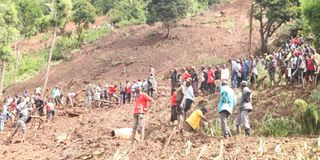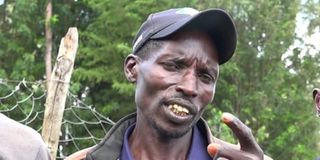Premium
The forgotten victims of Baringo landslides

Kenya Red Cross team and locals searching the bodies of victims of a landslide at Kapchebogel village in Baringo North on August 7, 2024.
Seven months have passed since a devastating landslide struck Kapchebogel village in Baringo North sub-County, killing four family members and leaving a trail of destruction in its wake.
In the aftermath of the August 6 disaster, Baringo County Commissioner Stephen Kutwa declared Kapchebogel village environmentally uninhabitable and directed the affected residents to relocate. The 27 displaced families sought refuge at Kasisit Primary School, approximately two kilometers away, while awaiting government-promised resettlement.
"A report had been drafted that would see the affected families compensated and resettled elsewhere so that they do not go back to the risky area," Mr Kutwa stated during the funeral ceremony for the four victims at Kasisit Primary School.
Among the most severely affected was Zakayo Ruto, 48, who lost his wife, Gladys Chepkangor, two sons – Evans Katamei (11) and Jonathan Katamei, and a nephew, Hillary Kabutiei (16) in the disaster.

The landslide completely destroyed Mr Ruto's four-roomed house, kitchen, and store where his teenage boys had been sleeping. His farmland was buried under debris.
The displaced families initially occupied two classrooms at Kasisit Primary School. However, when schools reopened a month later, they were instructed to vacate the premises. Without alternatives, most sought accommodation with well-wishers in neighbouring villages.
Mr Ruto and his three surviving children found shelter with a family in Sumbeiwonin village. "My three children and I have burdened the family that has hosted us for this long. I lost everything in the landslide and the butchery business I was running also collapsed," said Mr Ruto, who now does menial jobs to support his remaining family.
Read: 'I am devastated': Man recounts horror of Baringo landslide that killed wife, two sons, and nephew
His plea to the government remains simple: "Immediately we buried those who died in the tragedy, they left us on our own, with no food and nowhere to live," he told Nation.Africa, adding that no government official has checked on them or provided information about resettlement plans.
Mr Charles Kaino, another landslide victim, has been staying with his wife, four children, and mother at a well-wisher's home in Sogom village. "When we were on our own as we moved out of the primary school, a well-wisher from a neighbouring village hosted us, and we have overstayed at the host's house because we had only requested to stay for just a short time," said Mr Kaino, a farmer whose land was rendered unusable by the disaster.
With three children in college and secondary school, Mr Kaino struggles to cover educational expenses and basic needs. "I earned from farming but I don't have any land to farm anymore. Why did the government abandon us at the hour of need? It promised to give us an alternative land after we move out of the sloppy area, but went silent on us," he said.
Mr Haron Chepkong'a, who also lost access to his land, has been staying with a well-wisher in Sumbeiwonin village. His situation has grown more precarious as his host has recently requested that he begin paying rent.
"We sometimes go without food and now my host has requested I start paying rent. I don't know where I will get the money," he said.
Nation.Africa has learned that government food aid to the displaced families ceased approximately one month after their evacuation, leaving them dependent on community goodwill.
Local leaders have connected the current crisis to historical grievances. Baringo County Assembly Speaker Vincent Kemboi claims the landslides are a consequence of historical land injustices, arguing that residents were forced onto dangerous slopes after being displaced from more suitable lands.
"The four people who died in the landslide are products of historical land injustices by the government. In this community, no one lived in the steep areas until the early 1970's when the government ordered people to be moved out of forests and be given alternative land," said Mr Kemboi.
He elaborated on the historical context: "After their displacement, the government did not honor its promise, forcing them to settle on the slopes that were not good for habitation, since they had no alternative. The government took our land that is the present day Katimok and Saimo Forest decades ago and shortchanged the owners. We are still demanding that the government compensates the families who were displaced at the time, or we shall take the case to court. We demand justice, and we may even consider taking the matter to the International Court of Justice (ICJ) if need be."
Mr. Kemboi proposed a land exchange program that would relocate vulnerable families from landslide-prone areas to forest land, while converting the dangerous slopes to forest reserves for environmental conservation.
As the rainy season approaches, the displaced families of Kapchebogel remain in limbo, their futures uncertain as they continue to await the fulfillment of government promises made seven months ago.
Our efforts to reach the county commissioner on the matter were futile as he did not answer numerous calls nor respond to our inquiries through text messages.




